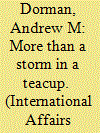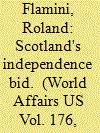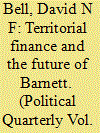|
|
|
Sort Order |
|
|
|
Items / Page
|
|
|
|
|
|
|
| Srl | Item |
| 1 |
ID:
131445


|
|
|
|
|
| Publication |
2014.
|
| Summary/Abstract |
In September 2014 the people of Scotland will vote on whether to become an independent nation, with the defence and security of Scotland proving to be one of the more vociferous areas of debate. This article argues that defence and security implications of this referendum are far more fundamental than either the 'yes' or 'no' campaigns have admitted. It makes four points. First, it suggests that the Scottish government's plans for defence and security in NATO and the EU are at odds with its proposed armed forces and that Scotland may well find itself having to make far greater commitments to defence to assure its allies. Second, it argues that a vote for independence will represent a game-changing event for the remainder of the United Kingdom's defence and security, which will have significant consequences for the United Kingdom's partners and allies in NATO, the European Union and elsewhere. Third, the article contends that even a vote against independence will have a long-term impact, in that the 'West Lothian question' and Scottish support for nuclear disarmament influence the 2015 Strategic Defence and Security Review. Finally, the article highlights how this issue has revealed weaknesses in the think-tank and academic communities, particularly in Scotland. The independence vote does, therefore, represent 'more than a storm in a tea cup' and thus there needs to be far greater engagement with these issues within the United Kingdom and elsewhere
|
|
|
|
|
|
|
|
|
|
|
|
|
|
|
|
| 2 |
ID:
127004


|
|
|
|
|
| Publication |
2013.
|
| Summary/Abstract |
The Scottish independence referendum debate, like the Act of Union of 1707, has significant religious dimensions. The Act gave special recognition through the monarch to the Presbyterian Church of Scotland. The Church, a national church, has not yet declared a position on independence, but is seeking to protect its existing privileges whatever the result. The Roman Catholic Church, recognised by the Scottish Parliament, unlike its formal rejection by the UK Parliament and monarchy, symbolically associates itself with the case for independence. Paradoxically, Catholics supporting independence subject themselves, in their religious lives, to an authoritarian foreign power. The SNP Scottish Government attempts to draw Roman Catholic support for independence from its traditional support base in the Labour Party by cultivating a sense of religious grievance that is not justified by the evidence. Old religious divisions are still relevant but non-religion is growing fast and resulting in new perspectives on the independence debate.
|
|
|
|
|
|
|
|
|
|
|
|
|
|
|
|
| 3 |
ID:
122117


|
|
|
|
|
| Publication |
2013.
|
| Summary/Abstract |
At exactly 17:14 on the evening of September 15, 2012, in Barcelona's Camp Nou stadium, thousands of fans at a packed soccer game stood up as one and chanted, "Independence!" The timing was chosen to coincide with the year 1714, when Spanish troops annexed Catalonia-of which Barcelona is the capital-to Spain. Catalonia has its own distinct language and culture, and Catalan activists have been fanning the flames of separatism ever since.
|
|
|
|
|
|
|
|
|
|
|
|
|
|
|
|
| 4 |
ID:
138874


|
|
|
|
|
| Summary/Abstract |
THE SCOTTISH independence referendum was held on 18 September 2014. From a voter turnout of 85 per cent, 55 per cent voted No to the question ‘Should Scotland be an independent country?’ The result provided something for both sides. For one, a 55 per cent
No vote can be portrayed as a decisive outcome that settles the matter for a generation. For the other, a 45 per cent Yes vote provides hope. In the short term, the hope was that the Smith Commission, formed to produce proposals for further devolution, would recommend a eaningful level of constitutional change. In the long term, it may be that the failure to deliver an adequate devolution ‘settlement’ produces enough of an appetite for a second, this time successful, referendum.
|
|
|
|
|
|
|
|
|
|
|
|
|
|
|
|
| 5 |
ID:
138877


|
|
|
|
|
| Summary/Abstract |
This article traces the changing funding relationships between Scotland and the UK government. Beginning from the Barnett Formula, it examines how the changing support within Scotland for greater political autonomy from Westminster has influenced the mechanisms that have determined Scotland's fiscal structure. Increasing support for the SNP, and then for the Yes campaign in the September 2014 independence referendum, has led to a mixture of new powers being granted to the Scottish Parliament. The Scotland Act 2012 extends the Scottish government's control over income tax and some other small taxes. Although independence was rejected by the Scottish people in September 2014, the ‘Vow’ made by the Westminster parties immediately before the vote is leading to far-reaching changes in the UK's fiscal structure. This will cause a very substantial change in intergovernmental relations within the UK, which the Barnett Formula may not survive.
|
|
|
|
|
|
|
|
|
|
|
|
|
|
|
|
|
|
|
|
|